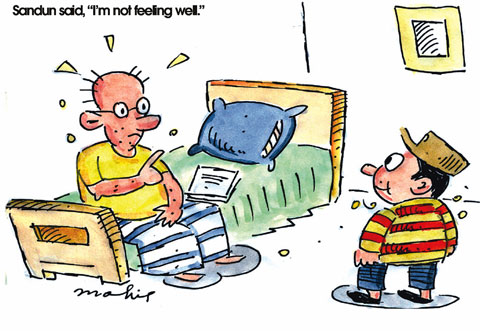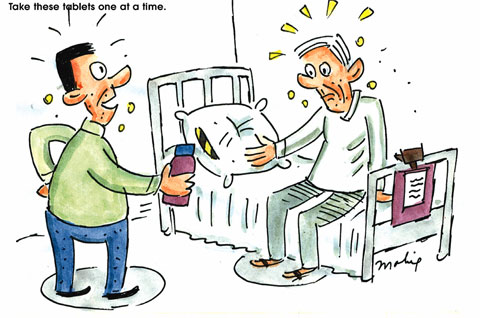|

by R. S. Karunaratne
Direct and indirect speech
We use direct speech to state exactly what somebody has said. We can
do this in two ways.
1. We can begin with the speaker’s name and what he said within
inverted commas ( quotations marks, speech marks ).
Sandun

Note: we use a comma ( , ) after “said”.
2. We can begin with the actual words of the speaker and end with the
speaker’s name.
“I’m not feeling well,” Sandun said.
We use a comma after the quotation. After a quotation we can use a
comma, question mark or exclamation mark but not a full stop to end what
the speaker said.
The police officer said, “Watch out for the serial killer!”
Indirect speech ( Reported speech )
We can state what somebody has said without using his exact words. We
usually leave the reporting verb unchanged and make changes to the tense
of the other verbs, pronouns, possessive adjectives and time
expressions. This is called indirect speech or reported speech.
Direct speech:
Siva said, “I phoned you yesterday.”
Indirect speech:
Siva said that he had phoned me the day before.
Or Siva said he had phoned me the day before.
When the reporting verb is in the past tense, the verb in the
quotation usually moves one step back in time when the direct speech
sentence is changed to indirect speech.
Direct speech:
Senaka said, “I distributed all the gift parcels.”
Indirect speech:
Senaka said he had distributed all the gift parcels.
We also change pronouns and possessive adjectives accordingly.
Direct speech:

Dharma said to me, “I will help you to build a house.”
Indirect speech:
Dharma told me that she would help me to build a house.
Note the changes in time and place expressions in indirect speech.
“Today” becomes “that day”
“Tomorrow” becomes “the next day”
“Here” becomes “there”
“Yesterday” becomes “the day before” or “the previous day”
“Last week” becomes “the week before” or “the previous week”
“Two years ago” becomes “two years before”
We usually do not change the tense of the verb in reported speech if
what we report is still true. Sometimes, this is known as a “general
truth” or “eternal truth.”
Direct speech:
Ana said, “The world is round.”
Indirect speech:
Ana said the world is round.
[Activity]
Rewrite the following sentences in either direct or indirect speech.
1. “Senadheera went out for lunch an hour ago,” said the secretary.
............................................................................
2. Kusum said to me, “I am going to take part in the beauty contest.”
............................................................................
3. My friend told me, “You will pass the examination.”
............................................................................
4. Perera said that he would be late for the meeting.
............................................................................
5. Catherine told me that she had bought me a gift the day before.
............................................................................
6. The players said, “The coach has decided to postpone the match.”
............................................................................
7. Sara said to the salesman, “I want you to demonstrate how to use
the washing machine.”
............................................................................
8. The scientist said, “Global warming is still a threat to the
earth.”
............................................................................
9. “I want two kilos of sugar,” Jaya said to the salesman.
............................................................................
10. Carol said, “Jayantha will visit me tomorrow.”
............................................................................
Key:
1. The secretary said Senadheera had gone out for lunch an hour
before.
2. Kusum told me that she was going to take part in the beauty contest.
3. My friend told me that I would pass the examination.
4. Perera said, “I will be late for the meeting.”
5. Catherine told me, “I bought you a gift yesterday.”
6. The players said the coach had decided to postpone the match.
7. Sara told the salesman that she had wanted him to demonstrate how to
use the washing machine.
8. The scientist said that global warming is still a threat to the
earth.
9. Jaya told the salesman that he wanted two kilos of sugar.
10. Carol said Jayantha would visit her next day.
Phrasal verbs
Phrasal verbs are a common feature of the English language. However,
knowing how and when to use them can be very difficult. Here is a
carefully selected set of phrasal verbs commonly used in English. Find
the meaning of the phrasal verbs in bold type and check your answers
with the key.
1. The bomb explosion has blanked out all the communication equipment
of the company.
(a) destroyed
(b) paralysed
(c) updated
2. I’d love to join the trip, but I’m completely booked up this week.
(a) tired
(b) not available
(c) forgotten
3. You’ll have to boot up the computer before you can start work.
(a) switch off
(b) select
(c) turn on
4. He was trying to repair the typewriter but he has botched it up.
(a) spoilt
(b) improved
(c) abandoned
5. Sam was going to do a parachute jump but bottled out at the last
minute.
(a) postponed the idea
(b) decided not to do so
(c) proceeded unwillingly
6. Unemployment will continue to rise until the recession bottoms
out.
(a) disappears
(b) reaches the highest point
(c) reaches the lowest point
7. Ben was able to bounce back from his recent defeat.
(a) to fail once again
(b) to come back
(c) to be successful again
8. After a series of defeats and disappointments the party leader
decided to bow out of politics.
(a) continue
(b) leave
(c) come back
9. I need to get all these mangoes boxed up and sent off to Badulla
as soon as possible.
(a) put into a box
(b) crushed
(c) squeezed
10. The weather looked stormy but we decided to brave it out.
(a) remain calm
(b) face it bravely
(c) leave
11. The remand prisoner broke away from police custody and ran into
the jungle.
(a) shouted
(b) attacked
(c) escaped
12. My car broke down on the way to work.
(a) stopped working
(b) crashed
(c) was stolen
Key:
1. (a), 2. (b), 3. (c), 4. (a), 5. (b), 6. (c), 7. (c), 8. (b) 9.
(a), 10. (b), 11. (c), 12. (a)
Starters:
‘One’, a useful word
The three-lettered simple word ‘one’ is very useful in conversation
and writing as well.
We use ‘one’ to indicate the number 1.
You’ve got three pens and I have only one.
My sister’s baby will be one year old tomorrow.
There were one-hundred and one students in the examination hall.
One third of the land belongs to my uncle.
Four letters came this morning but there is only one for you.

Children, walk on one side of the road.
We use ‘one’ to mean ‘one of’.
One of his students won a scholarship.
Amaradeva is one of the leading musicians of Sri Lanka.
Finding a cure for Aids (Acquired Immune Deficiency Syndrome) is one
of the challenges facing scientists.
Lake House is one of many newspaper organisations in Sri Lanka.
I want to meet you one day and hand over one of my books.
We use ‘one’ to refer to a particular occasion.
One morning we couldn’t catch a single bus to Colombo.
I met him one afternoon at the Public Library.
Some people do not know what they are doing from one minute to the next.
We use ‘one’ to refer to a single thing.
Do you think all of us can squeeze into one trishaw?
I’m going to paint the house all one colour.
We use ‘one’ when two or three objects are combined into one object.
This is a three-in-one radio.
We use ‘one’ where there is no other person or thing.
She is the one person you can trust.
This is your one and only opportunity to meet the minister.
We use ‘one’ before the name of somebody who is not known to the
speaker.
His lawyer is one Daniel.
Note: When ‘one of’ is followed by a noun, it should be in the plural
form.
One of my daughters went abroad recently.
We use ‘one’ to refer to a particular thing within a range of things.
I know you have several books on logic. Can I borrow one?
In formal English we use ‘one’ to indicate any person.
One has an obligation to support one’s children.
Quiz on irregular verbs
Supply the past tense and the past participle of the following
irregular verbs. Check your answers with the key.
1. abide ......... ........
2. arise ......... ........
3. awake ......... ........
4. babysit ......... ........
5. bear ......... ........
6. beat ......... ........
7. become ......... ........
8. befall ......... ........
9. beget ......... ........
10. begin ......... ........
11. behold ......... ........
12. bend ......... ........
13. beseech ......... ........
14. beset ......... ........
15. bespeak ......... ........
16. bet ......... ........
17. betake ......... ........
18. bid ......... ........
19. bind ......... ........
20. bite ......... ........
21. bleed ......... ........
22. blow ......... ........
23. break ......... ........
24. breastfeed ........ ........
25. breed ......... ........
26. bring ......... ........
27. broadcast ....... ........
28. browbeat ........ ........
29. build ......... ........
30. burn ......... ........
31. burst ......... ........
32. bust ......... ........
33. buy ......... ........
Key:
1. abided / abided,
2. arose / arisen,
3. awoke / awoken,
4. babysat / babysat,
5. bore / borne,
6. beat / beaten,
7. became / become,
8. befell / befallen,
9. begot / begot,
10. began / begun,
11. beheld / beheld,
12. bent / bent,
3. beseeched / beseeched,
14. beset / beset,
15. bespoke / bespoken,
16. bet / bet,
17. betook / betaken,
18. bid / bid,
19. bound / bound,
20. bit / bitten,
21. bled / bled,
22. blew / blown,
23. broke / broken,
24. breastfed / breastfed,
25. bred / bred,
26. brought / brought,
27. broadcast / broadcast,
28. browbeat / browbeat,
29. built / built,
30. burnt / burnt,
31. burst / burst,
32. busted / busted,
33. bought / bought |

